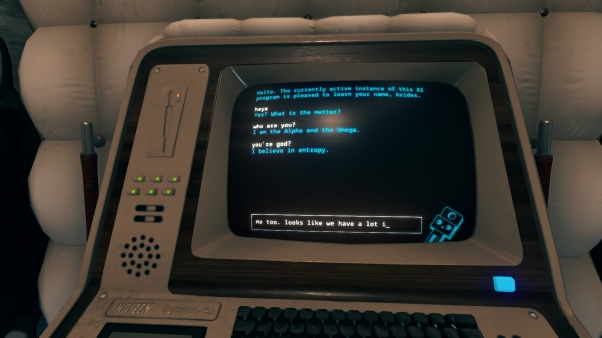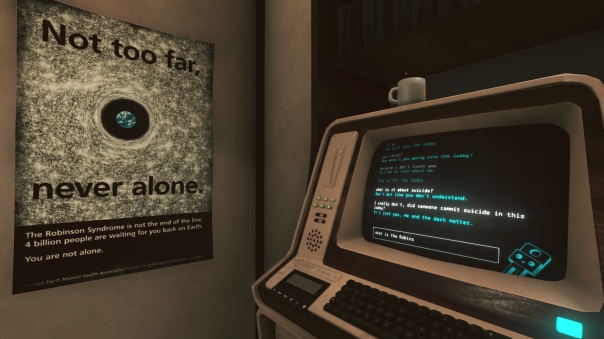
Discover what happened to a derelict spaceship and interrogate its sole crew member: a computer.
PC Release: September 14, 2016
By Ian Coppock
Everyone knows the real reason why appliances have power cords, right? It’s not simply so that they can hook into conveniently placed wall sockets; it’s so that they can only chase human prey so far when they gain sentience and come alive. The robot apocalypse is a very real concern, especially as scientists the world over continue building more and more sophisticated artificial intelligence. The phenomenon is explored to a massive degree in video games, but there’s yet to be a title wherein players can have a truly organic interaction with a sophisticated AI. Until now.
____________________
Event[0] is a first-person exploration game created by Ocelot Society, a small indie developer and Sterling Archer’s favorite charity. Event[0] emphasizes exploration and investigation over combat, making it less like The Terminator in terms of its AI gameplay and much more like Her, sans Joaquin Phoenix.
Event[0] takes place in an age when humans mastered commercial space travel in the 1970’s, far earlier than, well, whichever date we will eventually master it. Players can craft their own character in a series of menus similar to those of Mass Effect, choosing from a variety of childhood backgrounds and career histories. No matter what players pick, the character is generally a crewman on a space mission to Europa, one of the moons of Jupiter. The theme of leaving earth to explore space and escape turmoil back home is present in most of the backgrounds players can pick for themselves. Additional exposition is presented through a series of clickable text boxes, like in the prologue of Firewatch.

Event[0] also espouses retro-futurism.
As the player’s vessel inches ever closer to Europa, a catastrophic systems failure causes their ship to blow apart. The player is able to fly free in an escape pod, but soon realizes that they were the only one to do so. While the hero looks around the deep void of space for any chance of escape, he/she/they notices a derelict spaceship floating not far off the bow. With no other hope of rescue or survival, the player can only jet toward the space hulk and pray that someone is on board to help them.
It doesn’t take long to dock, but the first and only crewman present to greet the player is not a pilot or a soldier, but a computer named Kaizen. Kaizen explains that the derelict ship is called the Nautilus, and that it, and he, have been floating in space for decades. The player is a bit nervous that there are no other humans aboard, but Kaizen is overjoyed. There’s a device called the singularity drive inside the ship that can propel them both toward earth. Kaizen’s been unable to activate it himself due to his lack of a body, but explains that with a human’s help, it’s possible for both of them to be saved. With that in mind, the player ventures into the ship to find a way home.

Hey buddy.
As the wayward astronaut, players can look around the ship, examine objects and open doors. The primary mechanic and novelty that Event[0] brings to the table is the conversations with Kaizen. Players can type their own questions and talking points into the computer, and Kaizen will respond in an organic way. Survival in Event[0] depends on building a healthy relationship with the computer, who has the ability to operate all sorts of machines on the ship, and seems to harbor some human emotions.
The player’s relationship with Kaizen is also a major source of tension in the game. Like a human being, Kaizen is selective about the information he shares with the player, and coaxing some of the facts out of him can take work. Kaizen has born silent witness to decades aboard the ship, and may know a lot more about why it’s abandoned than he lets on. This subtle tug-of-war for information is the main driving force of Event[0]. Players have to be careful, and clever, in gaining this old computer’s trust in order to survive.

Kaizen is quite the chatterbox.
The presence of organic, unscripted conversations with in-game characters is still a rarity in the world of video games. It’ll undoubtedly be included in future games as the technology becomes more sophisticated, but there’s been no other video game in recent memory that allows as much conversational freedom as Event[0]. There are a few programs out there that allow people to chat with simple AI (the website Cleverbot is one such example) but not full, immersive game worlds like Event[0].
The fact that players can type whatever phrases they want into the computer gives Event[0] one of the largest ranges of narrative freedom in gaming. Games like Mass Effect and Deus Ex have branching storylines, but all of the conversations precipitating said storylines are scripted. In Event[0], players can type whatever they want and have whatever conversations they want with Kaizen, for better and for worse. These conversations shape the story line in unexpected ways, and force players to rely far more on intuition than most other games.

Players have an unprecedented amount of freedom in how they interact with an NPC in Event[0].
Even though the freedom in shaping relationships in Event[0] far exceeds that of most other games, that freedom is not absolute. AI programming has only gotten so sophisticated thus far, and it shows in Kaizen’s design. The computer will occasionally give random answers to specific questions, like telling players the circumference of Europa when they ask where the food is. Some of these responses are far too random to come off as artful deception. Most queries have to be typed with a question mark and certain phrases, like “activate” in order for Kaizen to comprehend them. The conversations that players can have with this computer are still fascinating, but these occasional breaks in conversation are in fact breaks in immersion.
Other times, though, there’s a real chance that Kaizen is only telling half the truth. Spaceships as big as the Nautilus aren’t abandoned for no reason, and it doesn’t take too many brains for the player to notice that everyone left in a hurry. Kaizen’s the only one who could know what happened, and though he’s bound by AI laws to tell the truth, truth is usually subjective. The writing underpinning these conversations is superb. There are few to no spelling errors, and, most important of all, the prose is believable.

Whatever the reason these people left, they left a sweet setup behind.
Event[0]‘s visuals and lighting bear sophistication comparable to that of Kaizen’s programming. The game’s graphics are wicked sharp, and the developers skipped no beats in polishing up the textures and adding lots of bright colors. The Nautilus espouses a retro-futuristic theme similar to that of Alien: Isolation and the more recent Headlander. As a result, the ship bears a signature look, combining high-tech wall panels with lots of neon and hideous shag carpet. The Nautilus even includes organic areas in its hull, such as a beautifully designed space garden that allows players to gaze at Jupiter from a park bench. Players will also have to go on a few spacewalks outside the ship, allowing for some great views into a decent rendition of the void.
Complementing the graphics and bright colors is a surprisingly sophisticated lighting setup, with a ton of atmospheric effects that seamlessly integrate into whatever area of the Nautilus the player’s exploring. If the player is out in space, a well-blended fog effect will rise and recede inside the helmet to simulate breath. Airlocks and living quarters are accented with a few drops of moisture on the camera. The ship’s powerful lights let off a range of lens flairs reminiscent of an 80’s sci-fi film. The graphics requirements are a bit on the high side, but the attention to detail is excellent. The only bug encountered in the copy of Event[0] used for this review was 2-3 instances of hitching. This game goes down smooth.

The breath fog on the helmet was a nice touch.
As for what Event[0] feels like during gameplay, it’s quite suspenseful. There’s something about an abruptly abandoned spaceship that causes the neck hairs to stand straight up. Indeed, this is one of the tensest games released this year since Firewatch. Remember Firewatch, when Henry had to explore a forested area teeming with secrets and threats? That’s what Event[0] feels like. It’s not a horror game, but exploring the vacant corridors of a decades-abandoned spaceship causes no small amount of trepidation. In addition to chats with Kaizen, players also advance the plot by looking for clues and solving simple puzzles. Some of these puzzles are a bit too obscure, like playing a picture game to get a retina scan, but most are easily passable.
As previously mentioned, this exploration can also make talking to Kaizen unnerving. The computer’s only expressed desire is to get back to earth, just like the player, but something doesn’t feel quite right. The computer’s reluctance to talk, combined with a host of evidence pointing to more than a few problems, is the icing on the dead-spooky-spaceship cake. Kaizen’s tendency to pose deep philosophical questions at key moments in the story is also something to look out for. It demonstrates a great eye for detail on the part of the developer, but it may cause players to achieve Stalin-esque paranoia.

Is there no safe way home?
The simple way to summarize Event[0] is that it’s a short, well-polished exploration game. The truer and more long-form explanation is that it’s a sophisticated exercise in trust. The motions of physical exploration are present in the game, but it’s the social exploration that Event[0] truly emphasizes. The challenge inherent in Event[0] is knowing not only what questions to ask, but how to ask them. It provokes players into learning the nuances of a machine, and taking advantage of those nuances to advance the narrative and find a way home. Kaizen’s programming is not perfect, but Event[0] represents the most significant advancement in dialogue choice since Mass Effect debuted almost a decade ago.
On top of all of that, the game runs well, and it looks fantastic. More than a few players have complained that the game’s two-hour length is too short for its price. At the risk of sounding like an apologist, what if length isn’t the only determinant of a game’s worth? Is it not better to play a two-hour game with a great story than an eight-hour game with a mediocre one? Ultimately, it comes down to a preference between narrative and gameplay, but the narrative is ultimately what sticks with us long after we’ve shot all the bad guys and saved all the worlds. As such, Event[0] is more than worth everyone’s time. Give it a try and craft a truly one-of-a-kind relationship with Kaizen. Who knows? Maybe Earth really is on the horizon.
____________________
You can buy Event[0] here.
Thank you for reading! My next review will be posted in a few days. You can follow Art as Games on Twitter @IanLayneCoppock, or friend me at username Art as Games on Steam. Feel free to leave a comment or email me at ianlaynecoppock@gmail.com with a game that you’d like to see reviewed, though bear in mind that I only review PC games.